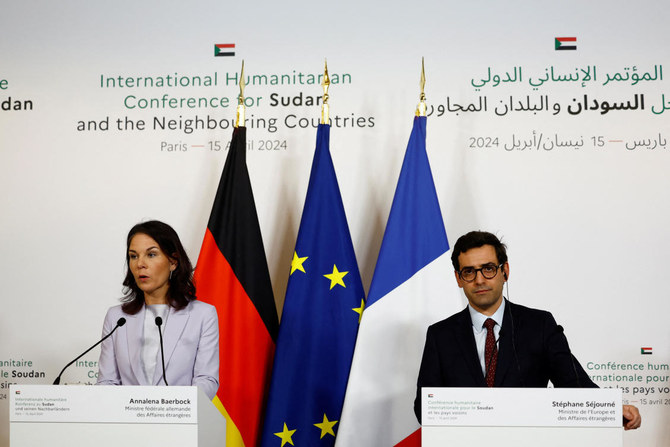
Dozens of countries and international institutions on Monday pledged more than $11 billion to help Pakistan recover and rebuild from the devastating floods it experienced last year, which UN Secretary-General Antonio Guterres called a “climate disaster of monumental scale.” Saudi Arabia and the Jeddah-based Islamic Development Bank accounted for about half of the pledges. Other countries and multilateral donors also pledged generously, more so than anticipated before the event.
The floods have affected about 33 million people and, at their highest, covered about a third of Pakistan’s land area. More than 1,730 people were killed and many more injured. More than 2 million homes and thousands of schools and health facilities were destroyed or seriously damaged. According to UN reports, many of the affected areas remain under water, with millions living near contaminated or stagnant waters. The government of Pakistan and the UN estimate the damage to exceed $30 billion. Rebuilding efforts are projected to cost more than $16 billion over the next three years and the current funding gap is estimated at $8 billion.
Pakistani Prime Minister Shehbaz Sharif told the conference that his country was racing against time to deal with those daunting damages. Foreign Minister Bilawal Bhutto Zardari described the floods as a “colossal calamity” and the “greatest climate disaster” in Pakistan’s history.Preliminary results from the International Conference on Climate-Resilient Pakistan 2023, held in Geneva on Monday, indicate that the world community has listened, donating more than $11 billion, some of which had already been announced or disbursed beforehand. The final tally may be revised, usually higher, depending on the organizers’ efforts that usually follow such conferences to verify and record all pledges.
The largest multilateral pledges came from the Islamic Development Bank ($4.2 billion), the World Bank ($2 billion), the Asian Development Bank ($1.5 billion), the Asian Infrastructure Investment Bank ($1 billion) and the EU ($544 million).
The largest single-country contribution came from Saudi Arabia ($1 billion), followed by France ($384 million), the US ($200 million), China ($100 million), Germany ($94 million) and Japan ($77 million).
Saudi Arabia has been at the forefront of efforts to stand with Pakistan before the flood and since. In addition to its pledge at the Geneva donors’ meeting on Monday, it announced on Tuesday that the Kingdom was considering a significant increase in its investments in Pakistan’s economy to $10 billion, as well as increasing the ceiling on deposits into Pakistan’s central bank to $5 billion from the current $3 billion.During a visit by Crown Prince Mohammed bin Salman to Pakistan in February 2019, he stressed Saudi Arabia’s faith in Pakistan’s future, saying that: “We believe Pakistan is going to be a very, very important country in the coming future and we want to be sure that we are part of that.” Deals valued at about $20 billion were signed during that visit. They included plans to build an oil refinery and petrochemical complex, two liquefied natural gas-powered power plants and alternative energy and mining projects.
In October 2021, during a visit by then-Prime Minister Imran Khan to Riyadh, it was announced that Saudi Arabia would provide aid worth $4.2 billion, including $3 billion as a deposit in Pakistan’s central bank to help stabilize the rupee’s value.
In September 2022, after last summer’s floods, the King Salman Center for Relief and Humanitarian Aid launched a relief effort to provide aid to the victims and announced the arrival of the first planeloads of assistance. In October, it said it had sent about 4,000 tons of food relief, with the aid providing help for about 800,000 people affected by the disaster.
The compassion the world has shown toward victims of this immense disaster is admirable. The larger-than-expected tally of pledges in Geneva this week indicates the considerable goodwill the donors have toward the government of Pakistan and their trust in its ability to meet the needs of those affected.However, after pledges are made and verified, much more work is needed to speed up aid delivery. Many factors could affect the pace of disbursement and officials at both the national and international levels need to remain closely engaged to deal with those impediments.
There are global factors to be considered so as not to affect the pace of aid delivery. For example, the Ukraine crisis, at some point, diverted much previously anticipated aid to poor countries. In addition, should political differences or stringent conditions arise between a donor and the recipient country, dialogue is needed to deal with them.More frequently, it is the small things that could delay aid, such as the capacity to prepare and articulate feasible aid packages. Bureaucratic and technical delays are very common, as well as mismatches between donors’ due diligence requirements and the recipient country’s funding procedures. Only through constant engagement between the two sides can these delays be avoided. Donor coordination and input from international organizations is always needed. Large donors such as Saudi Arabia, the Islamic Development Bank and the World Bank are especially important in this coordination.
Rebuilding the devastated areas of Pakistan and providing for the victims has become a collaborative undertaking that will take years. The funds raised in Geneva this week represent the current needs in a three-year process. It could take more. If the recovery and rebuilding efforts are done properly, they could jump-start Pakistan’s economy, spur domestic demand and lead to considerable growth.












